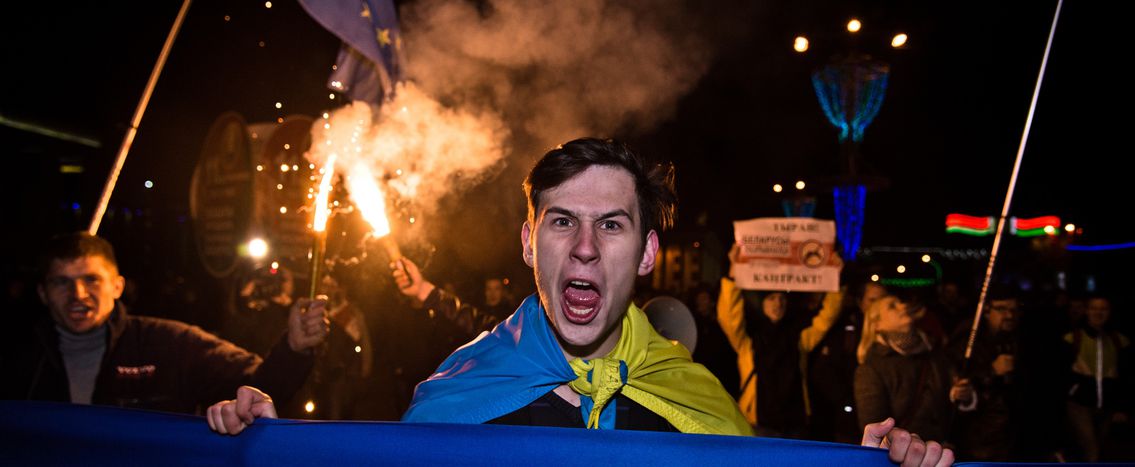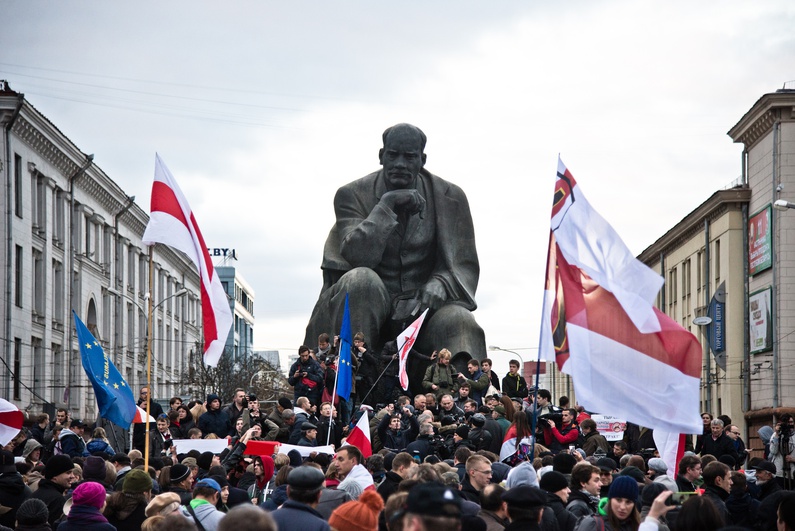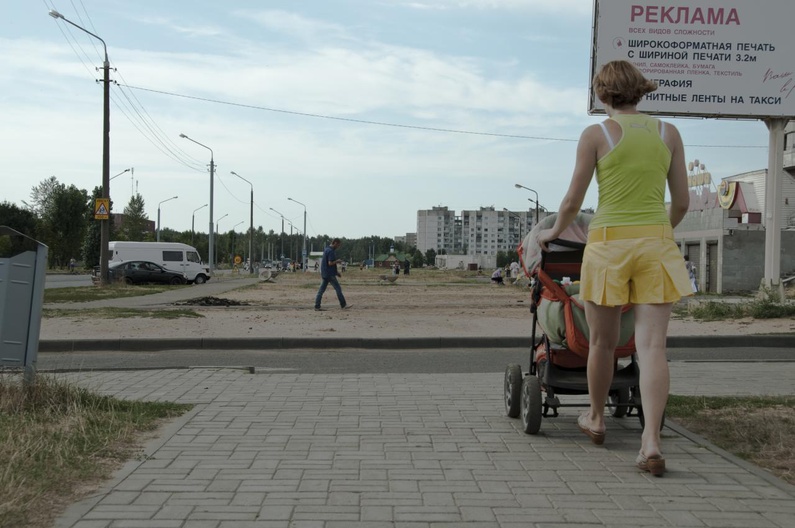
No spring in Belarus
Published on
Translation by:
Francesca TealThe pictures had almost been forgotten of the awful moustachioed dictator, who let protesters be beaten up and political opponents be thrown in prison. Yet the Belarusian president has unfortunately remained true to himself.
A demonstration in Minsk on Freedom Day on March 25th was already nipped in the bud. Hundreds of peaceful protestors, even pensioners and uninvolved onlookers were dragged into prisoner transport vehicles and were beaten up by special police forces from the capital city’s streets. Previous to this, police forces stormed the office of the human rights organisation Viasna and arrested those present to stop them from monitoring the protests. The Green Party’s office already suffered the same fate the previous evening – ten of the people present were sentenced to 10-15 days in prison. Their offence: they had gathered donations, food and clothing for the arrested protestors. Since the rally on March 25th wasn’t an isolated incident. Before this, more than 300 people were arrested nationwide since the start of March.
Declaring war on the "social parasite" tax
Since mid-February, protests against the Presidential Decree No. 3 have been taking place all over Belarus. According to the decree, those who have been unemployed for more six months in the year are expected to pay a so-called ‘social parasite tax’ of around 185 euros as a punishment. That’s a considerable amount in a country where the average monthly income comes to 350 euros and has dropped 3.9% compared to last year, according to the Federal Foreign Office. And suddenly people of any age are taking to the streets to protest – many for the first time ever.
In fact, protests in this form are a one-off in Belarus until now. They take place differently from the classic protests – not only in Minsk but also in bigger and smaller places. In online videos you can see many older and rural citizens grumble about Decree No. 3 and their president. And yet, the rural population and pensioners were thought of as faithful Lukaschenko supporters until now- he in return guaranteed them punctual pension payments and a certain social stability. It’s understandable that Batka (the father), as Lukaschenko is called, is feeling nervous if his fellow countrymen are suddenly rebelling
Batka gets nervous
For almost 23 years he has governed Belarus with an iron fist and has tolerated no dissent. At the age of just 62, further terms in office for the apparently eternal president seem likely. That’s because Lukaschenko isn’t unsettled by the pseudo-elections every 5 years, as he demonstrated in December 2010. Still, several oppositional presidential candidates were beaten up by security guards and thrown into prison cells on the eve of said election. Two of them weren’t released until years after, most recently Mikalaj Statkevitsch in 2015.
Mikalaj Stratkevitsch, an oppositional social democrat, had called for the demonstration on March 25th in Minsk alongside others. The Belarusian secret service consequently arrested him on the day of the demonstration but they denied any knowledge about his whereabouts. It wasn’t until two days after the demonstration that they let him go to the KGB - which is still truly called as it was in the times of the Soviet Union.
If the initial protests against Decree No. 3 were tolerated by the surprised authorities to start with, then the thumbscrews would noticeably be tightened by now. Even the opposition marginalised by the regime were surprised by the protests and tried in recent weeks to give the until now spontaneous, improvised protests more structure and direction. As it became apparent that the protests were persisting, spreading out and growing, the regime began at the start of March to take action against organisers and participants of the protests, as well as independent reporting media.

So, alongside Mikalaj Statkevitsch, Wital Rymascheuski and Pawel Siewjarynets, two co-chairmen of the Belarusian Christian Democracy were also arrested and sentenced to prison sentences of 15 days. The human rights centre founded in 1996, called Viasna, counted more than 1100 arrests since the start of March: 266 were sentenced from 2 to 15 days in prison, in 159 cases fines were imposed.
After Viasna and the Green Party, the offices of the independent TV channel, Belsat, were stormed on March 31st, as Belsat had reported extensively on the nationwide protests for weeks. One of the most active oppositionists, Zmitser Dashkevich, was also arrested. The leader of the “Young Front” has already served two long-term prison sentences because of his peaceful resistance against the regime and was recognised respectively by Amnesty International as a prisoner of conscience. An accusation of fuelling mass unrest faces other defendants as well as Dashkevich, a father of two small children. So far, many things suggest that the accusations have been made up by the regime, to lock him away for several more years.
It's no spring awakening
“Nothing new in the East” we’d want to say, when we compare current events with the past two decades under Lukaschenko. But had many even talked of a “Belarusian spring”? - the possibility of the start of the end of dictatorship?
Of course, the initially nationwide, cross-generational protests in Belarus were something never seen before. Many people are unhappy with their economic situation and the “social parasite” tax makes them angry as well. But the protests aren’t a mass movement yet. Belarus isn’t just proverbially a police state. The repressions of the dissidents are noticeable and real. At the same time, you can lead a normal life in Belarus, seek your private happiness and keep out of politics. Don’t provoke the regime, let one carry on in peace. And the state-controlled media goes one step further to warn the people subtly of the dangers of a Belarusian public gathering and participation in protests.
 So it’s the all too understandable fear in dictatorships of the possible consequences of showing their resentment on the streets, which prevents many people from doing so. In Minsk, a city with almost 2 million citizens, less than 2,000 people dared to attend the demonstration on March 25th. As well as the cold winter weather on that day, there’s a strong impression that there’ll be no spring in Belarus for now.
So it’s the all too understandable fear in dictatorships of the possible consequences of showing their resentment on the streets, which prevents many people from doing so. In Minsk, a city with almost 2 million citizens, less than 2,000 people dared to attend the demonstration on March 25th. As well as the cold winter weather on that day, there’s a strong impression that there’ll be no spring in Belarus for now.
Certainly, even long-term, strongly established dictatorships end suddenly and unexpectedly. And the Belarusian people wish for a life in freedom, democracy and constitutionality, with a prospering economy in any case- just like in the Baltic neighbouring states, three of them also former Soviet republics.
However, as well as Lukaschenko there’s still someone who won’t approve of a change in the neighbouring country – Vladimir Putin. For the ruler in the Kremlin, Belarus is still stronger than Ukraine as an indispensable sister state and an important part of his sphere of power.
After the Russian annexation of Crimea in 2014 and Putin’s support of the separatists in Donbass, it’s unfortunately impossible to rule out anything in Belarus. And a war, an invasion of Russian troops, would be the worst but not the most unlikely of all conceivable scenarios. From this perspective, even Lukaschenko is the lesser evil. Also with Lukaschenko it’s almost certain that he won’t voluntarily give up his power and will ultimately let his people be fired at, like Yanukovych in the Ukraine.
The prospects for Belarus are therefore hardly “springlike”, but rather wintery and bleak. In the coming weeks we’ll see whether the “social parasite tax” and the general economic misery protests drive more and more people to the streets. Another demonstration in Minsk has been announced for the traditional Chernobyl March (April 26th) and for Labour Day (May 1st). Human rights organisations fear more mass arrests after recent events and the further increase of persecution of dissidents by the state.
Here, clear words and actions from democratic states and the EU could help. Since Lukaschenko doesn’t want to entirely surrender himself to Russia economically and politically, he’s dependent on cooperation and emergency loans from the West. The EU in particular could bring about an end to the wave of arrests, and release all of the political prisoners in Belarus through threats of economic sanctions. Belarusian oppositionists and human rights activists justly criticise that the regime obviously has enough resources available for the purchase of the most modern prisoner transport vehicles- while many people across the country live in poverty. Here western financiers have to control what exactly is being financed with their emergency loans on-site.
The message of the West should be clear to Lukaschenko: economic cooperation and further financial aid only in return for the respect of human rights. A police state shouldn’t be co-financed any more. Putin would be Lukaschenko’s better contact for that.
One thing’s for sure: eventually the political spring will enter Belarus. This can probably only happen if big brother Russia comes to a democratic change. Until then we should dedicate ourselves to the persecuted oppositionists, human rights activists, journalists, as well as the release of the political prisoners in Belarus. And we should even go to Belarus to get to know the people – adventurously with the overnight train or (since the start of this year) even without a visa for 5 days on arrival by plane.
__
The author of this article is a member of the NGO Libereco – Partnership for Human Rights which campaigns for the respect of political-civil human rights.
Translated from Kein Frühling in Belarus



